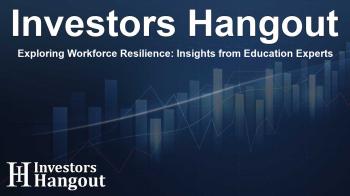Exploring Workforce Resilience: Insights from Education Experts

Understanding Resilience in the American Workforce
The University of Phoenix College of Doctoral Studies has recently explored the theme of resilience within the American workforce in a new white paper titled “The Resilience Factor: American Workforce's Adaptation to Ongoing Challenges.” This insightful work, authored by Karen Johnson, Ed.D., who is a senior fellow in the University’s Center for Educational and Instructional Technology Research (CEITR), delves into the ongoing challenges faced by workers today.
The Importance of Resilience
Through her research, Johnson emphasizes that resilience is a vital trait that workers must cultivate to navigate the complexities of modern employment. In this era of continuous change, workforce resilience can not only help individuals cope with stress but also bolster their overall career satisfaction and engagement. The findings are made more poignant by the data garnered from the University of Phoenix’s Career Institute Career Optimism Index study, which sheds light on current trends affecting job seekers and workers alike.
Addressing Mental Health and Career Optimism
Johnson's findings indicate a growing need for mental health resources among workers. She points out that many individuals report anxiety related to their jobs, highlighting a pressing concern for both employers and employees. The paper advocates for organizations to understand this interplay between mental health and career resilience. By carefully addressing these factors, businesses can create supportive environments that not only enhance employee well-being but also drive innovation and productivity.
Building Resilience through Upskilling
The research also showcases how upskilling is a critical aspect of building resilience. Johnson asserts that when workers invest in their own education and skill acquisition, they not only secure their current job positions but also lay down the groundwork for future career opportunities. This commitment toward personal and professional growth not only increases job security but also enhances self-efficacy, paving the way for long-term resilience.
Johnson's Expertise and Contributions
Dr. Karen Johnson stands out in her commitment to education and mentoring. As a Senior Fellow in CEITR and a faculty member in the College of Doctoral Studies, she has guided over 100 students through their dissertation processes, showcasing her dedication to the growth of future leaders.
Educational Background and Qualifications
Dr. Johnson holds a doctorate in Higher Education from Texas Tech University, as well as a Master of Arts in Secondary Education and a bachelor’s degree from the University of Texas. Her extensive academic background and experience enrich her contributions to the field of educational research.
Accessing the Full White Paper
The full white paper is available for those interested in obtaining deeper insights into resilience in the workplace. The white paper is a valuable resource for organizations aiming to adapt to the changing workforce landscape. By implementing the recommended strategies outlined in the paper, businesses can ensure that they remain competitive while fostering a robust work environment.
About University of Phoenix
University of Phoenix has continually sought to innovate to assist working adults in advancing their careers. They provide flexible schedules, relevant courses, and a career services commitment, which ultimately helps students pursue their academic and personal aspirations while managing their busy lifestyles.
About the College of Doctoral Studies
The College of Doctoral Studies at the University of Phoenix addresses contemporary business challenges and social issues. Its research program aims to develop future leaders by placing students at the center of a collaborative ecosystem of experts and resources. This initiative not only prepares students for leadership roles but also enables them to conduct research that can have immediate applications in their workplaces.
Frequently Asked Questions
What is the main focus of the new white paper?
The white paper discusses resilience in the American workforce, emphasizing the need to address mental health and promote career optimism.
How does the University of Phoenix support working adults?
They offer flexible schedules, relevant course offerings, and a commitment to career services, helping students balance education with their professional lives.
Who authored the white paper?
The white paper was authored by Dr. Karen Johnson, a Senior Fellow in the Center for Educational and Instructional Technology Research.
What benefits does upskilling provide according to the paper?
Upskilling helps workers enhance their job security and fosters a stronger sense of self-efficacy, which contributes to building resilience.
Where can I find the full white paper?
The full white paper is available on the University of Phoenix Career Institute website, offering detailed insights on workforce resilience and strategies.
About Investors Hangout
Investors Hangout is a leading online stock forum for financial discussion and learning, offering a wide range of free tools and resources. It draws in traders of all levels, who exchange market knowledge, investigate trading tactics, and keep an eye on industry developments in real time. Featuring financial articles, stock message boards, quotes, charts, company profiles, and live news updates. Through cooperative learning and a wealth of informational resources, it helps users from novices creating their first portfolios to experts honing their techniques. Join Investors Hangout today: https://investorshangout.com/
Disclaimer: The content of this article is solely for general informational purposes only; it does not represent legal, financial, or investment advice. Investors Hangout does not offer financial advice; the author is not a licensed financial advisor. Consult a qualified advisor before making any financial or investment decisions based on this article. The author's interpretation of publicly available data presented here; as a result, they should not be taken as advice to purchase, sell, or hold any securities mentioned or any other investments. If any of the material offered here is inaccurate, please contact us for corrections.
